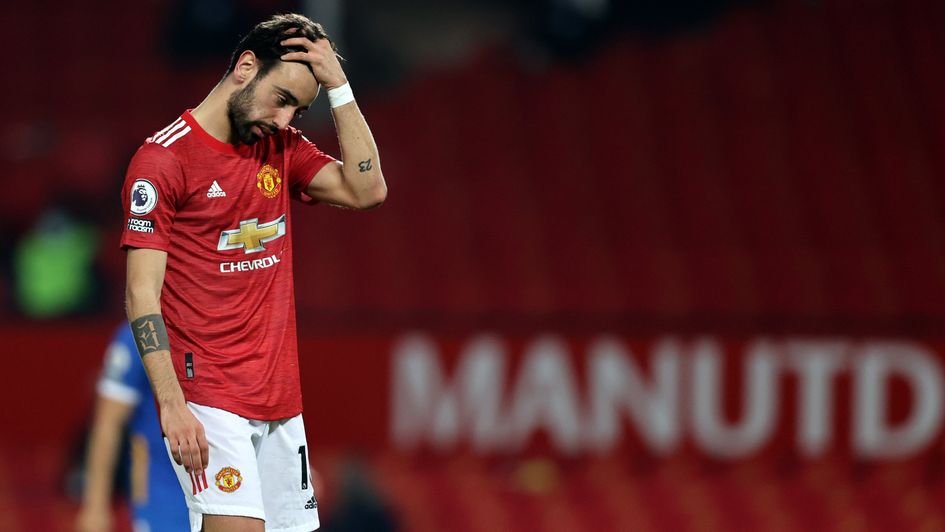Sir Alex Ferguson used to prime his teams to peak at the business end of the season. Perhaps Bruno Fernandes got there three months early.
When he scored against Newcastle in February, he had 22 goals for the season, four of them in three games over a week.
More than two months later, his Europa League brace against Real Sociedad remain his last goals in open play, his spectacular strike against West Bromwich Albion four days earlier the most recent one in the Premier League.
In two months, Fernandes has two penalties – away at Granada and Manchester City – in 14 Manchester United appearances; 16 games if his Portugal caps are factored in. The great guarantee of goals has disappeared, except from 12 yards.
Still shooting, just not scoring
Between the 3-1 win against Newcastle and the Europa League semi-final against Roma, Fernandes has had 34 shots for club and country that were not penalties: none went in. Fourteen were on target, even if five of those were for Portugal against Azerbaijan.
One explanation is that exhaustion has blunted his edge. Fernandes’ season for club and country has already included more than 4,500 minutes and that, roughly, he was better in the first 3,400. Certainly the statistics indicate a downturn in his output.
What is expected goals (xG)?
- Expected goals (xG) is a metric that measures the quality of any given scoring opportunity
- Expected goals for (xGF) is the xG created by a team
- Expected goals against (xGA) is xG conceded by a team
In his last nine league games, starting with Newcastle, Fernandes’ only two goals are spot kicks.
In that time, his non-penalty xG is 1.91, an average of 0.21 per 95. It is down, if not dramatically, from his previous non-penalty xG of 0.26 per 95 (for a total of 6.21).
His total number of shots, at 27, brings an average of 3.0 per game, a slight reduction on his seasonal average of 3.30.
Decline in Fernandes' creativity
There is actually a bigger decline in his creative figures. Up and to and including the match at West Brom, Fernandes’ average expected assists per 95 minutes was 0.36. Since then, it has dropped to 0.23. He has only played 21 key passes, 2.33 per game, whereas he was averaging three per game before then. He has made 40 shot-creating actions in nine matches, below a seasonal average of 4.98 per 95 minutes.
But the big effect is cumulative. Fernandes’ combined xG and xA per 95 in the Premier League was 0.87 up until the middle of February and is 0.60 since then. It reflects poorer finishing, both by the Portuguese and his United team-mates.
In his first 24 league games, he had overperformed both his xG (11.82, to 14 goals) and his non-penalty xG (6.21, with eight goals). Since then, his two goals have come from an xG of 3.51 and a non-penalty xG of 1.91 has brought no goals.
In the first two-thirds of the season, he had nine assists from an xA of 8.49; since then, it is two from 2.16 and since creating a goal against Newcastle on February 21, it is one from an xA of 1.87.
And yet United have only lost once in Fernandes’ downturn: at Leicester in the FA Cup, when he did not start. Since his last league goal in open play, they have 21 points from a possible 27. But the fact the only points to escape their grasp were all in 0-0 draws – at Crystal Palace, Chelsea and Leeds, three matches where he failed to register a shot on target – showed his loss of form may have had an impact.
Pogba, Greenwood and Rashford in form
But that has been mitigated as others have compensated. Paul Pogba has become more of a creator. Up until the middle of February, he was averaging 0.07 expected assists per 95 minutes. Since then, it is 0.26; his expected goals per 95 has gone from 0.12 to 0.28.
Mason Greenwood is United’s top scorer in that time, going from 0.20 xG per 95 to 0.39 and from 0.11 expected assists to 0.15.
Marcus Rashford has created more (0.15 expected assists, compared to 0.09). Nevertheless, United have only scored 11 goals in their last eight league games. They have averaged 4.75 shots on target per game in that time; before then, it was 6.16. A loss of form for Fernandes has a knock-on effect.
In some respects, his efforts cannot be faulted. The two games in which he has made most pressures this season came in that time: away at Chelsea and Tottenham. He had more touches against Brighton, Burnley and Tottenham than in meetings earlier in the season.
Apart from Chelsea and Spurs, his pass completion rate has been above his seasonal average of 74.1. Perhaps that suggests he is taking fewer risks. He has not completed more than seven passes that enter the final third in the last nine league games; he did so five times before then. Nor has he mustered more than four completed passes into the penalty area in that time, whereas he did in six previous matches.
It points to a gradual loss of influence. For much of his United career, Fernandes has been the ultimate numbers player. And his numbers have gone down of late.
